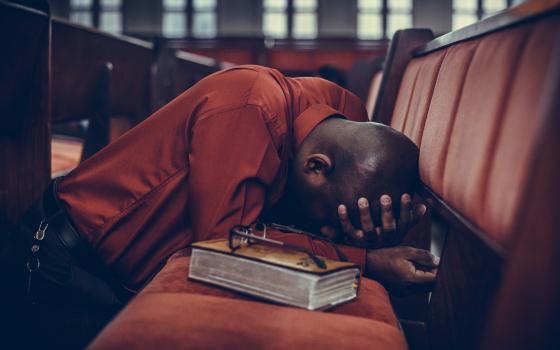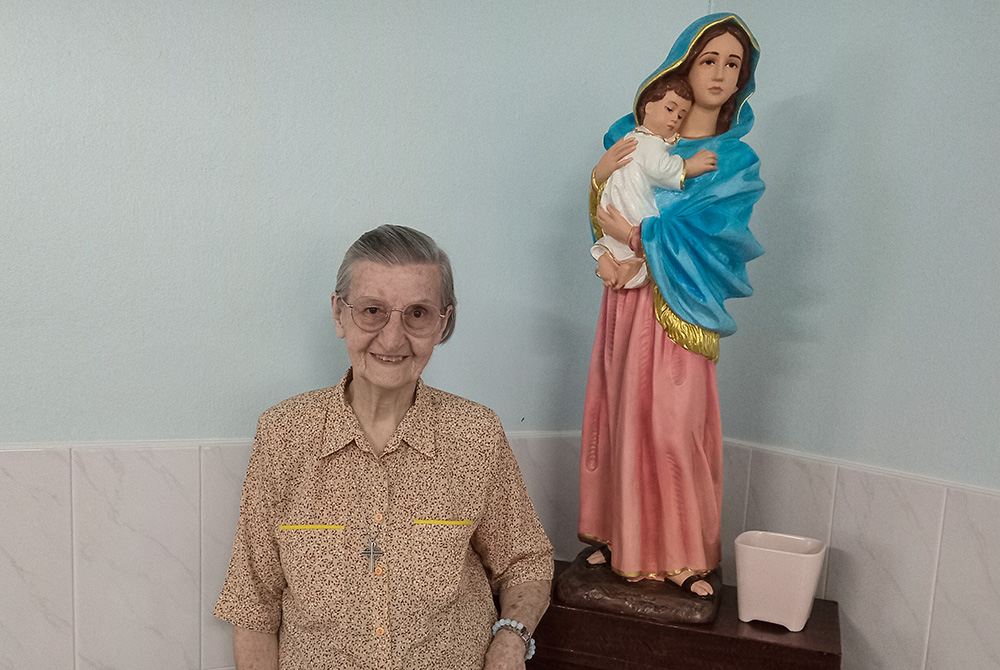
Sr. Louise Horgan, 90, at the Fatima Self-Help Centre in Bangkok. More than four decades of gentle determination and dedication to uplifting Bangkok's most vulnerable have made Horgan a well-respected pillar of the Bangkok community. (Courtesy of Louise Horgan)
More than four decades of gentle determination and dedication to uplifting Bangkok's most vulnerable have made Sr. Louise Horgan, a Sister of the Good Shepherd, a well-respected pillar of the Bangkok community.
Horgan, 90, shows no sign of surrender. While her primary focus is on marginalized women and children, she also supports migrants who arrive in Bangkok from Pakistan and Nepal in search of better opportunities.
In 1978, Horgan founded the Fatima Self-Help Centre in Bangkok, dedicated to helping women and girls break the cycle of poverty through skills training, such as sewing and dressmaking, enabling them to secure livelihoods for themselves and their children. In 2020, Irish President Michael Higgins recognized Horgan's contributions with the Presidential Distinguished Service Award for the Irish Abroad.
The Fatima Self-Help Centre's work has expanded significantly since its founding. Under Horgan's leadership, its services now include a preschool for slum children, adult education and skills training, a live-in program for at-risk teenage girls, school sponsorships and an education program for refugees.
Horgan spoke to Global Sisters Report about her life and experiences as a missionary in Thailand.
GSR: Please share about your early life.
Horgan: I fondly remember my childhood in rural Farnivane, in the beautiful Irish countryside, where I grew up with my two brothers and sisters. Our family worked hard to make ends meet, but we always accepted the Lord's will in everything we did. No matter the circumstances, kindness and generosity were at the heart of our home, and we shared that spirit with everyone we met.
Advertisement
My parents' strong faith and trust in God had a profound impact on me. I have cherished memories of us gathering together as a family every night to pray the rosary before bed. That prayer time strengthened our faith and deepened our bond as a family.
We were raised to be responsible and independent. I remember cycling 7 miles to school every day, come hail, rain or shine. Life wasn't always easy, but there was no shortage of love in our home. We grew up to be resourceful, resilient and spirited, shaped by the values instilled in us by our parents and by our unwavering faith in God.
What inspired you to join religious life?
When a Good Shepherd Sister visited from Sri Lanka seeking mission candidates, I felt a deep stirring in my heart. Though my parents disapproved, I was certain of my calling: to serve God and care for poor children.
After training as a nurse, I finally received permission to leave home. I set sail on the Grenoble with a young lady from Donegal, beginning my training and a lifelong friendship. Little did I know it would be 18 years before I returned to Ireland.
Those early years were lonely and difficult, but my faith kept me strong. After my first profession, I was sent to Sri Lanka, where I spent almost five years caring for abandoned infants. I loved them dearly, and leaving them was heartbreaking.
Later, after my final profession, I was sent to Bangkok, Thailand, where my mission of love and service continued.
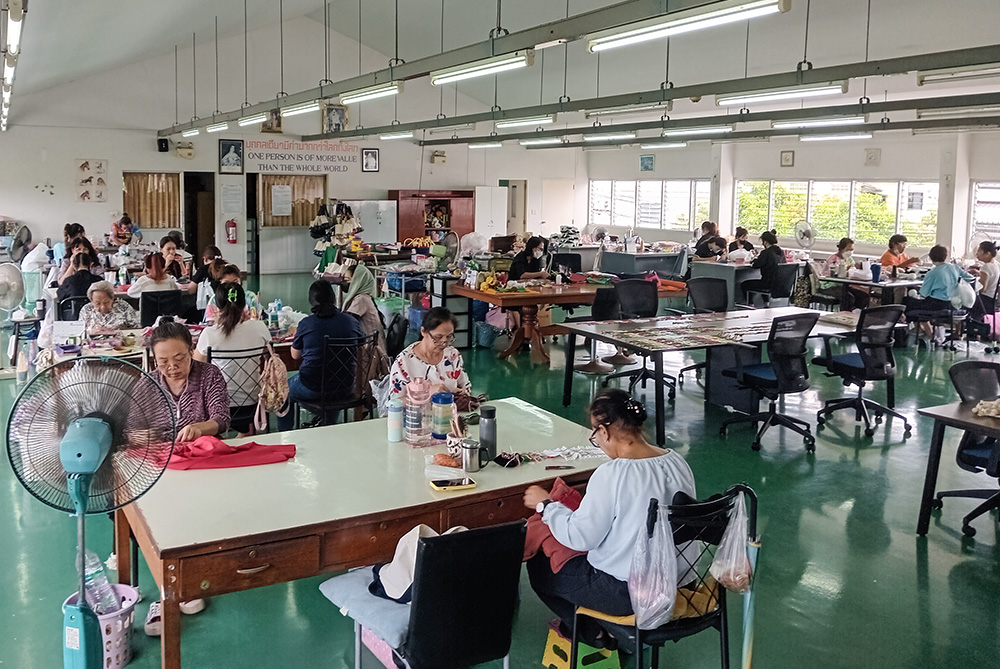
A group of women artisans work at the Fatima Self-Help Centre in Bangkok, where women and girls break the cycle of poverty through skills training, such as sewing and dressmaking. (Courtesy of Louise Horgan)
What challenges did you face?
In my day, a working sister went wherever she was sent — a blessing and a challenge. Caring for those in need is like being a parent. You love, nurture, instill values and impart skills to the best of your ability, but there comes a time when you must let go, trusting that you have done enough to help them stand on their own.
There are times when you are called to serve elsewhere. One door proverbially closes, and another opens. And while you deeply miss those you leave behind, you soon find yourself surrounded by new and unfamiliar faces — each carrying their own burdens and dreams, waiting to be heard, to be loved, to be guided.
Of course, every mission comes with its own language. I was raised speaking Gaelic in Ireland, so I first had to learn English, French, the local dialect in Sri Lanka, and Thai. At first, this was daunting, but I was able to learn with the help of the local communities. After all, people everywhere seem fluent in the universal language of love.
How do you empower women and girls in a rapidly growing but unequal Bangkok?
Our work is to provide shelter, livelihood, food and the necessities of life. But the true mission — the heart of it all — is to give abundant and unconditional love. I have always been deeply moved by the struggles of women and children. Women and girls are the beating heart of every community. Over the years, females have made significant progress worldwide, including in Thailand. Yet, many are still exploited, disadvantaged, displaced or overwhelmed by life's struggles.
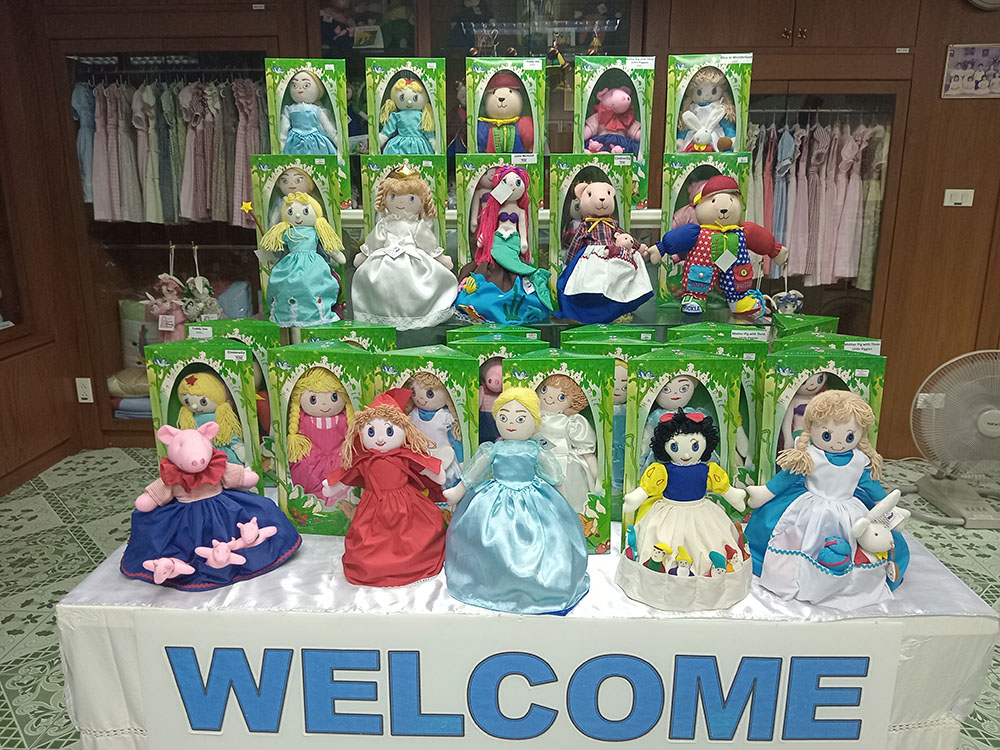
Handicrafts made by women at the Fatima Self-Help Centre in Bangkok, where women and girls break the cycle of poverty through skills training, such as sewing and dressmaking (Courtesy of Louise Horgan)
Every child is a precious gift, but for young mothers trapped in poverty and misfortune, the responsibility of providing shelter, food and education can feel unbearable. They carry a heavy burden and need support — not just to survive but to build a future for themselves and their children.
The nature of charity has changed. At the center, we focus on education for children and youth. But we also recognize the importance of empowering women. At our training center, adult women are taught marketable skills in sewing and crafts, allowing them to create products with the potential to generate income.
It is a slow process, and at times returns are modest. But, through our programs, these women gain a sense of independence. They learn to provide for themselves and their families rather than relying on handouts. This approach offers a healthier, long-term solution that gives women and their children a chance at a better life.
Tell us more about the Fatima Self-Help Centre.
Our center has five key units dedicated to serving those in need. We support women through pregnancy in the mother and baby unit, educate young children in our day care unit, and offer skills training for displaced teens. The sewing center helps women gain independence, and we care for refugee children with love and education.
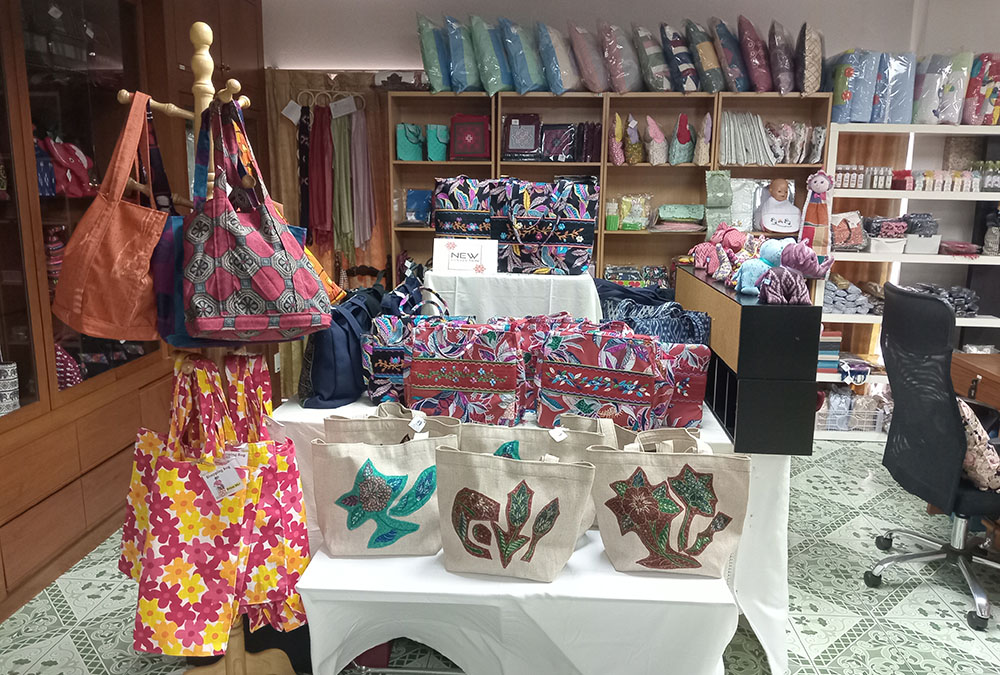
Handicrafts made by women at the Fatima Self-Help Centre in Bangkok, where women and girls break the cycle of poverty through skills training, such as sewing and dressmaking (Courtesy of Louise Horgan)
Almost 300 people attend the center daily, which is managed by a small but dedicated team. I always encourage women and young people to take education and skill training.
When I came to Thailand, I witnessed a poor country. After increasing education, the nation is [now] considered an emerging or upper-middle-income economy.
What advice would you give to younger sisters, volunteers and social workers who are beginning their journey in service?
What has relentlessly driven me and my fellow sisters all these years is so often overlooked in today's world — the very heart of Christ's mission.
In the synagogue at Nazareth, Jesus made it absolutely clear what his purpose was, and it remains our guiding light to this day. This is our calling. This is our mission. And with God's grace, we will continue to walk this path, bringing love, hope and healing to those in need.






